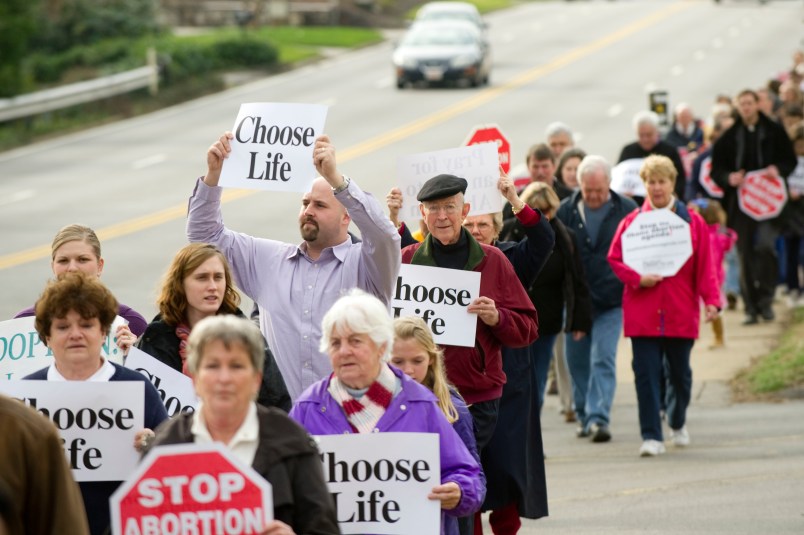The South usually gets a bad rap when it comes to reproductive rights. And this isn’t entirely undeserved: Mississippi only has one abortion clinic in the state, anti-choice politicians in my home state of Alabama seem to be in a perpetual race to see who can strike the biggest blow against abortion access, and let’s not even get started on Texas.
But since 2000, Tennessee has offered better protections for reproductive rights than the U.S. Constitution. That was the year that the state Supreme Court ruled that abortion was a fundamental right, and outlawed mandatory waiting periods and other barriers to access.
However, that could change tomorrow, thanks to an initiative on the state’s ballot. Amendment 1 would give lawmakers the ability to create laws regarding abortion, something they are currently unable to do. Anti-choice politicians would be able to put mandatory waiting periods back on the books, as well as other laws designed to make abortion as difficult to access in Tennessee as in neighboring states.
This means that the proposed amendment wouldn’t just affect women living inside the state. It would also affect women in those neighboring states, whose barriers to accessing high-quality abortion care are so great that traveling to Tennessee is the less onerous — not to mention safer — choice. And it would set a dangerous precedent for anti-choice politicians and activists in other states that hold abortion as a fundamental right.
This appears to be a classic example of a putative solution in search of a problem. Women do not have abortions in Tennessee in higher numbers than the country as a whole; as of 2011, Tennessee had an abortion rate of 13.1 per 1,000 women. Compare that with the national rate that year, which was 16.9 abortions per 1,000 women.
It is true that women come in from other states to have abortions in Tennessee, something abortion opponents love to call “abortion tourism.” The state’s health department found that in 2013, 23 percent of all abortions performed in the state were on women that lived elsewhere. These numbers are more a reflection of other states’ unnecessarily restrictive policies than of any so-called “leniency” in Tennessee. After all, the state requires parental consent and prohibits the use of both telemedicine and Medicaid funded-abortion except in cases of incest, rape, or endangerment of the woman’s life. And it’s not as if the state is overrun with clinics; as of 2011, 96 percent of all counties in the state lacked an abortion provider. Such restrictions hardly make Tennessee the abortion haven of the South.
If women are traveling over state lines to terminate pregnancies, it’s because the options in their states are even worse. For example, in some parts of Mississippi women have to drive three hours to reach the state’s sole clinic; but those same women would only need to travel 20 minutes to get to a clinic in Memphis. Given those geographic realities, it’s no wonder that a woman in Mississippi that needs an abortion might decide to go to Tennessee instead of staying in her state.
Proponents of Amendment 1 claim that the ballot measure is necessary “to restore our voice to decide what we think is best for women and children in Tennessee,” according to David Fowler, the president of the anti-choice Family Action Council of Tennessee (FACT). Just why Fowler believes that he deserves a “voice” about what’s best for women he doesn’t know is unclear, but it might lie in the overall dim view he and his organization seem to take of women’s intelligence. Like other Amendment 1 supporters, FACT contends that the state Supreme Court was wrong to strike down laws regarding “abortion-specific informed consent” and waiting periods that would allow for a “period of reflection.”
The idea that women who choose to have abortions need to “reflect” about their choice furthers the misogynistic falsehood that women can’t be trusted to do what’s best for themselves and their families on their own. It ignores the fact that the majority of women who seek abortion care are already mothers, and know very well what terminating a pregnancy means. And it blithely glosses over the reality that for many women, the effort spent in saving the money, finding a clinic and scheduling the appointment means they have spent more time “reflecting” on this decision before setting foot in the clinic waiting room than most people ever give to a medical procedure.
Amendment 1 supporters are waging a campaign against empathy, common sense, and respect. They are refusing to accept that politicians should not act as physicians, just as they are turning a blind eye and deaf ear to the reasons that women cross state lines to seek legal medical care.
If those activists in favor of Amendment 1 truly wanted to reduce the overall number of abortions in Tennessee, they would be advocating for policies in both their state and others that reduce the number of unplanned and unintended pregnancies. Policies that ensure women and men have reliable and affordable access to comprehensive medical care, including reproductive health and contraception; and policies that support teaching comprehensive sexual education in schools. They would also support policies and programs that help parents have healthy and economically stable families, like guaranteed maternal and paternal leave policies and universal pre-kindergarten. Unfortunately, the fact that they don’t is proof of their real motivation.
Unlike bombastic rhetoric about making Tennessee an “abortion tourism” capital, those concerns are not exaggerated. They’re not hyperbolic, and they don’t disappear when you cross the Tennessee state lines. They’re concerns that this entire country is long overdue in addressing in any substantive and meaningful way.
Sarah Erdreich is the author of Generation Roe: Inside the Future of the Pro-Choice Movement. She lives in Washington, D.C. with her family.









